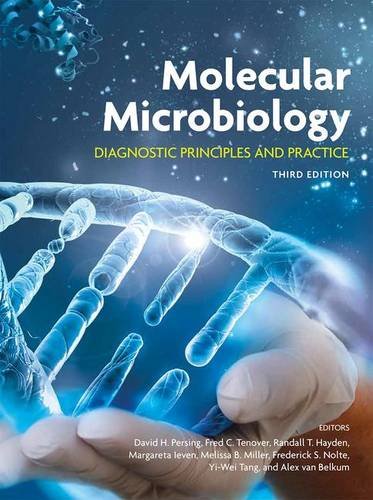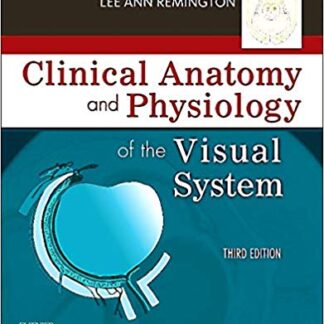Description
Molecular Microbiology: Diagnostic Principles and Practice 3rd Edition by David H. Persing, ISBN-13: 978-1555819088
[PDF eBook eTextbook]
- Publisher: ASM Press; 3rd edition (April 19, 2016)
- Language: English
- 835 pages
- ISBN-10: 1555819087
- ISBN-13: 978-1555819088
Presenting the latest molecular diagnostic techniques in one comprehensive volume.
The molecular diagnostics landscape has changed dramatically since the last edition of Molecular Microbiology: Diagnostic Principles and Practice in 2011. With the spread of molecular testing and the development of new technologies and their opportunities, laboratory professionals and physicians more than ever need a resource to help them navigate this rapidly evolving field.
Editors David Persing and Fred Tenover have brought together a team of experienced researchers and diagnosticians to update this third edition comprehensively, to present the latest developments in molecular diagnostics in the support of clinical care and of basic and clinical research, including next-generation sequencing and whole-genome analysis. These updates are provided in an easy-to-read format and supported by a broad range of practical advice, such as determining the appropriate type and quantity of a specimen, releasing and concentrating the targets, and eliminating inhibitors.
Molecular Microbiology: Diagnostic Principles and Practice:
- Presents the latest basic scientific theory underlying molecular diagnostics
- Offers tested and proven applications of molecular diagnostics for the diagnosis of infectious diseases, including point-of-care testing
- Illustrates and summarizes key concepts and techniques with detailed figures and tables
- Discusses emerging technologies, including the use of molecular typing methods for real-time tracking of infectious outbreaks and antibiotic resistance
- Advises on the latest quality control and quality assurance measures
- Explores the increasing opportunities and capabilities of information technology
Molecular Microbiology: Diagnostic Principles and Practice is a textbook for molecular diagnostics courses that can also be used by anyone involved with diagnostic test selection and interpretation. It is also a useful reference for laboratories and as a continuing education resource for physicians.
Table of Contents:
Contributors
Preface
Section I: Novel and Emerging Technologies
1 Nucleic Acid Amplification Methods Overview
2 Application of Identification of Bacteria by DNA Target Sequencing in a Clinical Microbiology Laboratory
3 Microbial Whole-Genome Sequencing: Applications in Clinical Microbiology and Public Health
4 Digital PCR and Its Potential Application to Microbiology
5 Massively Parallel DNA Sequencing and Microbiology
6 Next-Generation Sequencing
7 Pathogen Discovery
8 Matrix-Assisted Laser Desorption Ionization-Time of Flight Mass Spectrometry for Microbial Identification in Clinical Microbiology
9 Multiplex Technologies
Section II: Metagenomics: Implications for Diagnostics
10 The Skin Microbiome: Insights into Potential Impact on Diagnostic Practice
11 The Gastrointestinal Microbiome
12 The Vaginal Microbiome
13 Microbial Communities of the Male Urethra
14 The Human Virome in Health and Disease
Section III: Health Care-Associated Infections
15 Molecular Detection of Staphylococcus aureus Colonization and Infection
16 Molecular Diagnostics for Clostridium difficile
17 Overview of Molecular Diagnostics in Multiple-Drug-Resistant Organism Prevention: Focus on Multiple-Drug-Resistant Gram-Negative Bacterial Organisms
18 Detection of Vancomycin-Resistant Enterococci
Section IV: Molecular Diagnostics and Public Health
19 The Impact of Molecular Diagnostics on Surveillance of Foodborne Infections
20 Role of Molecular Methods in Improving Public Health Surveillance of Infections Caused by Antimicrobial-Resistant Bacteria in Health Care and Community Settings
21 Molecular Diagnostics: Huge Impact on the Improvement of Public Health in China
22 Surveillance and Epidemiology of Norovirus Infections
23 Molecular Diagnostic Assays for the Detection and Control of Zoonotic Diseases
Section V: Syndromic Diagnostics
24 Molecular Approaches to the Diagnosis of Meningitis and Encephalitis
25 Using Nucleic Acid Amplification Techniques in a Syndrome-Oriented Approach: Detection of Respiratory Agents
26 Molecular and Mass Spectrometry Detection and Identification of Causative Agents of Bloodstream Infections
27 Molecular Diagnosis of Gastrointestinal Infections
28 Diagnostic Approaches to Genitourinary Tract Infections
29 Syndromic Diagnostic Approaches to Bone and Joint Infections
Section VI: Virology
30 Molecular Detection and Characterization of Human Immunodeficiency Virus Type 1
31 Molecular Detection and Characterization of Hepatitis C Virus
32 Molecular Detection and Characterization of Hepatitis B Virus
33 Molecular Detection of Human Papillomaviruses
34 Molecular Diagnostics for Viral Infections in Transplant Recipients
Section VII: Fungi and Protozoa
35 Molecular Detection and Identification of Fungal Pathogens
36 Molecular Approaches for Diagnosis of Chagas’ Disease and Genotyping of Trypanosoma cruzi
37 Molecular Approaches for Diagnosis of Malaria and the Characterization of Genetic Markers for Drug Resistance
38 Molecular Detection of Gastrointestinal Parasites
Section VIII: Point-of-Care/Near-Care Diagnostics
39 Molecular Diagnostics and the Changing Face of Point-of-Care
40 Point-of-Care Technologies for the Diagnosis of Active Tuberculosis
41 Molecular Diagnostics for Use in HIV/AIDS Care and Treatment in Resource-Limited Settings
42 Rapid Point-of-Care Diagnosis of Malaria and Dengue Infection
Section IX: The Host and Host Response
43 Implications of Pharmacogenetics for Antimicrobial Prescribing
44 Exploiting MicroRNA (miRNA) Profiles for Diagnostics
45 Host Response in Human Immunodeficiency Virus Infection
46 Biomarkers of Gastrointestinal Host Responses to Microbial Infections
Section X: Information Technology
47 Point-of-Care Medical Device Connectivity: Developing World Landscape
48 WHONET: Software for Surveillance of Infecting Microbes and Their Resistance to Antimicrobial Agents
49 Cloud-Based Surveillance, Connectivity, and Distribution of the GeneXpert Analyzers for Diagnosis of Tuberculosis (TB) and Multiple-Drug-Resistant TB in South Africa
Section XI: Quality Assurance
50 Molecular Method Verification
51 Molecular Microbiology Test Quality Assurance and Monitoring
52 Proficiency Testing and External Quality Assessment for Molecular Microbiology
53 Practices of Sequencing Quality Assurance
54 Verification and Validation of Matrix-Assisted Laser Desorption Ionization Time of Flight Mass Spectrometry-Based Protocols
Section XII: The Business of Diagnostics
55 Improved Diagnostics in Microbiology: Developing a Business Case for Hospital Administration
56 Molecular Diagnostics and the Changing Legal Landscape
Index
Dr. Persing is the Executive Vice President and Chief Medical and Technology Officer at Cepheid and Consulting Professor of Pathology at Stanford University School of Medicine. Over the past 25 years, he has held leadership roles in academia and industry, starting with the design, implementation, and operation of the first PCR laboratory at the Mayo Clinic in the early 1990s. His interest in the democratization of molecular diagnostic methods has been longstanding, starting in 1993 with publication the first widely adopted textbook to include PCR protocols and guidelines for laboratory operations. His more recent work has focused on the enablement of molecular diagnostic technology to meet global needs. He has published over 300 peer reviewed articles and reviews, many of which are considered seminal works in the field. He has served as Editor in Chief for 5 textbooks published by ASM Press.
Fred C. Tenover is Vice President of Scientific Affairs, Cepheid; Consulting Professor, Pathology, Stanford University School of Medicine; and Adjunct Professor, Epidemiology, Emory University. Prior to joining Cepheid in 2008, Dr. Tenover served as Associate Director, Laboratory Science, Healthcare Quality Promotion Division and Director, Office of Antimicrobial Resistance, Centers for Disease Control and Prevention. He is a Diplomate of the American Board of Medical Microbiology and a Fellow of both the American Academy of Microbiology and the Infectious Disease Society of America. He has authored over 350 peer-reviewed journal articles and book chapters and has edited 10 books.
What makes us different?
• Instant Download
• Always Competitive Pricing
• 100% Privacy
• FREE Sample Available
• 24-7 LIVE Customer Support




